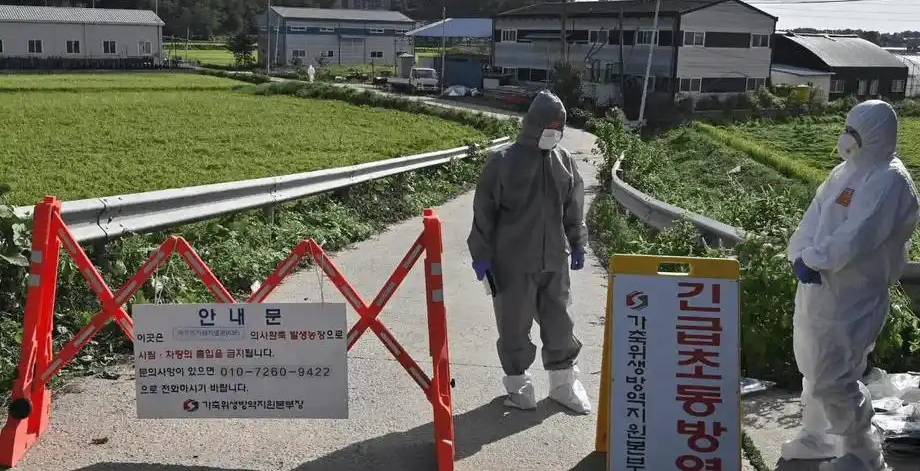
On November 25th local time, the Central Accident Handling Office for African Swine Fever in South Korea reported that an outbreak of African swine fever occurred at a pig farm in Tangjin City, Chungcheongnam-do. The Central Accident Handling Office raised the national African swine fever crisis alert level to "severe" starting from the 25th. The pig farm where the outbreak occurred was housing 463 pigs. Two pigs died on November 17th and 18th, and four pigs died on December 23rd and 24th. The Chungcheongnam-do Health Inspection Institute conducted inspections on the dead pigs and the other 14 pigs at the pig farm and determined that the relevant pigs were positive for the swine fever virus. This African swine fever outbreak is the second in South Korea after the one that occurred in Yeoncheon County, Gyeonggi-do in September this year. It is also the sixth African swine fever outbreak this year.
The impact of the African swine fever outbreak in South Korea is complex and multi-faceted, especially on the commercial sector. This is mainly reflected in the pork market, the livestock industry, related industrial chains, and international trade. First, the impact on the pork market. After the outbreak of African swine fever in Yeoncheon County, Gyeonggi-do in September 2025, the average retail price of pork in South Korea soared to 2,752 won per 100 grams, reaching a new high. This price level has a significant impact on the daily lives of ordinary citizens, especially those in low-income groups, facing greater economic pressure. Although the epidemic led to the culling of pigs in some local areas, the affected farms were small in scale, and the government reduced preventive culling measures, so the overall impact on pork supply and demand was limited. For example, the farm in Yeoncheon County only raised about 1,000 pigs, accounting for 0.01% of the national pig inventory. The government reduced preventive culling measures and used market regulation to prevent a sharp reduction in supply, so pork prices did not experience long-term sharp fluctuations. The outbreak raised public concerns about pork safety, and some consumers turned to chicken and beef as substitutes, resulting in a decrease in pork demand.
Second, the impact on the livestock industry. The epidemic led to direct losses for farmers, such as culling of pigs and shutdown of the farm. In the Yeoncheon County outbreak this year, 847 pigs were culled, and farmers faced the double pressure of production costs and income interruption. Small-scale farmers, due to their weak risk resistance, may accelerate their exit from the market, while large-scale livestock enterprises, with their financial and technical advantages, expand their scale and promote the industry towards a more standardized and intensive direction. To prevent the epidemic, pig farms need to strengthen disinfection and isolation measures, increasing operational costs. For example, pig farms in the south need to disinfect water sources during the rainy season to eliminate the risk of virus contamination.
Third, the impact on related industrial chains. The tight supply of pigs led to difficulties in acquisition by slaughterhouses and idle processing capacity. At the same time, the epidemic may trigger consumers' concerns about the safety of processed meat products, affecting sales. The decline in pig inventory led to a reduction in feed demand, and feed enterprises faced pressure from a decline in sales. Veterinary drug enterprises may benefit from the increased demand for epidemic prevention and control, but the overall market volatility increased. The increase in pork prices compressed the profit margins of retailers, and some merchants used promotional activities to dispose of inventory. In the catering industry, dishes based on pork (such as Korean barbecue and pork bone soup) saw an increase in costs, which may drive menu price adjustments or the use of substitutes.
Fourth, the impact on international trade. The African swine fever outbreak may lead to restrictions on South Korean pork products by importing countries, affecting export income. The shortage of domestic supply may prompt South Korea to increase pork imports, but the global spread of the epidemic may limit import sources, exacerbating supply shortages. South Korea has smuggling channels for pigs and their products with neighboring countries, and the epidemic may spread to other countries through cross-border transmission, triggering regional public health crises.
In summary, the outbreak of African swine fever in South Korea is like a "heavy stone" thrown into the commercial sector, causing ripples in multiple fields. In the face of this complex situation, the business community in South Korea needs to respond actively and make flexible adjustments. The government also needs to continuously strengthen supervision and support, jointly promoting a stable recovery and sustainable development of the business environment after the impact of the pandemic.

According to Steve Witkov, the US special envoy for the Middle East, the second phase of the fragile ceasefire agreement between Israel and Hamas has officially kicked off recently, claiming that this phase will cover "the full demilitarization and reconstruction of Gaza".
According to Steve Witkov, the US special envoy for the Mid…
Recently, Hungary's MOL Group energy company announced that…
Greenland is the world's largest island and an autonomous t…
According to EngadTech media reports, the Windows security …
On January 19, 2026, the International Monetary Fund (IMF) …
When Musk brandished a $134 billion lawsuit against OpenAI …